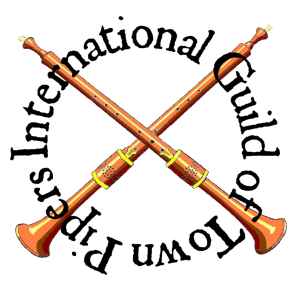Worcester Waites
The Waites of Worcester – The Evidence
by David Jarratt-Knock
In 1568-9, the Chamber Order Book of the City of Worcester recorded that:
it is agreed That the Auditors Mr Bailiffs & their brethren in the End of the Audit shall by their discretions take order touching the liveries of the musicians”,
which tells us that a group of musicians needing liveries was active in Worcester, but that the city auditors perhaps needed reminding to take account of this.
Harry Smythe, who died in Worcester in 1575, may have been one of the city waits. His Will and Probate Inventory lists ‘player’s gear’, ‘vyalls and books’, and ‘recorders’.
The instruments and books were left to his boys:
vnto my boyes all my Instruments bothe vyalls & Recorders & theyr boks”
Also, he left his wife Katherine
all my tymber where soever yt dothe lye & my wares that are readie made & all my tolles”
Which might suggest he was also a maker of instruments.
In 1585-6, the Chamber Order Book notes that the bailiffs and aldermen of Worcester should meet with ‘Thomas Wheler the musician’ and
make agreement with him for playing the waytes of this City yearly from the feast of Saint Michael until the feast day of the purification of the blessed virgin Mary, & that therefore he have such yearly fee of the City as the said officers & their brethren shall think convenient & shall set down upon such conference as aforesaid”.
In 1598-9, the Chamber Order Book refers to a request from the Bishop of Worcester that
the Cornitors or Musicions’ be formally recognised as the city waits and receive suitable recompense for their duties, and ‘to take the benevolence of every Citizen of this City as hath been accustomed”.
This description of the musicians as ‘cornitors’ suggests that the Worcester waits were playing cornetts (doubtless among other instruments) by the 1590s. The entry also confirms that the waits were an established group by this time, but that the Bishop felt the need to support the Waits with the city’s secular authorities suggests, perhaps, a slightly uneasy relationship.
After the Bishop’s intervention in 1598-9, the records are silent on waits in general, and cornettists in particular, until 1618-19, when the cathedral accounts list a payment of 20 shillings to
goodman Stanton the Musician for playing on the Cornetts in the Quire”.
It is not clear whether Stanton was a member of the City Waits, although this seems likely, and it would accord with what is known about Waits, duties in other cities. It is also clear that the Worcester Waits were an ensemble capable of producing musicians of some distinction, as the records relating to the English Royal Court Musicians lists a cornett player called William Howes (c.1616-1676), who was
bred up among the musicians or waits in Worcester”.
Like many other cities’ waits, the Worcester Waits performed outside the city. They received payments from the city of Coventry for playing there in 1613, 1623 and 1631, and there is also a payment to them on 30th June 1642 in the Household Accounts of Joyce Jeffreys, ‘spinster of Hereford’.
On 17th November 1642, the Chamber Order Book recorded that:
It is ordered that John Browne & his Company of musicians called the waites be suppressed from playing of their instruments about the City in the morning, And that they may not expect any recompense for their pains….”
1680s: Scandall has bin given by Roger Folbrooke the Elder, a Lay-Clerke of this Church, by associating himself with the Town Musick. It was decreed that he shall determine, and give his Answer before the first of March next, whether he will relinquish the Town-Musick, or resign his Lay Clerk’s place. In the furure all Lay Clerks were to give surety of £100 that they would not play in any tavern, ale house or victualing house.
1684
An Account of the Progress of his Grace Henry the First Duke of Beaufort through Wales, 1684. T. Dineley (1684)
…with drums, trumpetts, ye city-waites, haut-bois, flutes, other wind musick, together with harps, Welsh and Irish, viols, violins, and other stringed instruments”
Names of Some Worcester Waits
Source: Chevil, Elizabeth Jane (1993). Music Societies and Musical Life in Old Foundation Cathedral Cities 1700-60: PhD Thesis, King’s College, London.
Charles Clarke snr. 1720-
Charles Clarke jr. 1729-
William Clarke 1760-
1720 – 1756
According to city records, Mr Charles Clarke, an oboist from Worcester, was one of the town waits. He became a freeman of the city in 1720, and by 1735 was chief wait. His musician son was paid by the council in February 1756 (£1 10s) and in January and March.
From 1750 on, references are made to Mr. Clarke’s partner, who was probably Mr Jones from Worcester, another hautboy.
1757
1757 (16s). William Clarke (his grandson?) was admitted as a wait in 1760.
